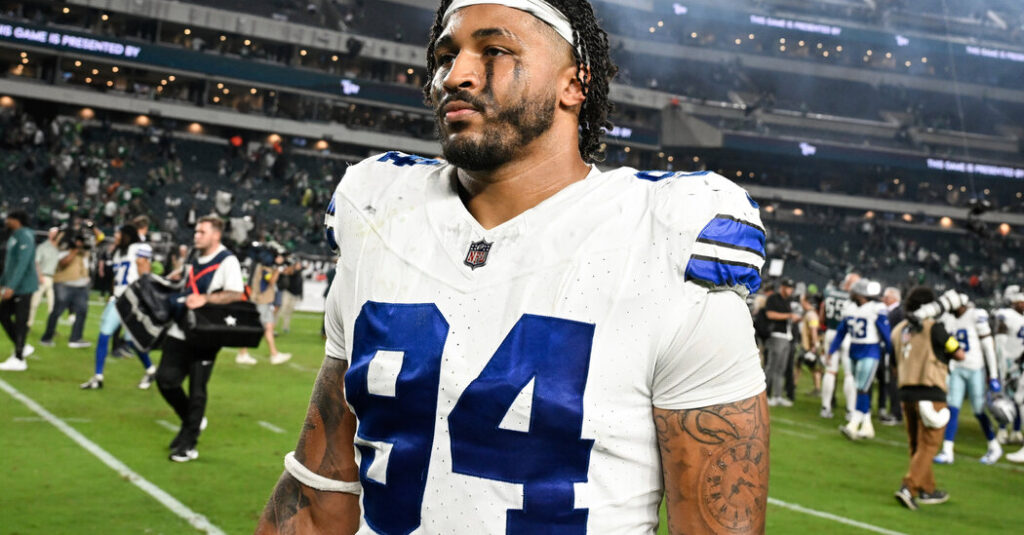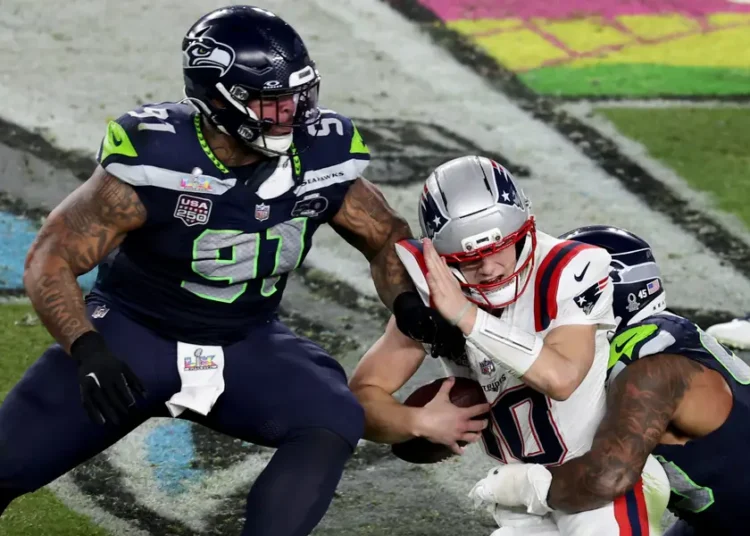A cadre of Dallas Cowboys players chased after the football as it tumbled into the end zone under the bright lights of “Monday Night Football.” In a flash, one player emerged in front of the pack — a 268-pound defensive end who smothered the ball for a touchdown.
To most Cowboys fans, it was 6 points scored on a blocked punt. But to many in western Michigan, it was the culmination of a lifetime of hard work for the funny but quiet, sports- and video-games-obsessed guy they knew, Marshawn Kneeland, who had spent 24 years outrunning circumstances, loss and doubt to make the N.F.L.
That touchdown on Nov. 3 was his first in the league, and the congratulatory texts flooded in, including from one of his college coaches. The next day, Mr. Kneeland was still buzzing from the touchdown, and he told the coach, Lou Esposito, that he planned to come back to Michigan that week. Mr. Kneeland said he had something to share. Mr. Esposito asked him what it was. “Good news,” he responded.
Two nights later, Mr. Kneeland was dead, following what the authorities in Texas said was a police chase, a crash and, then, a self-inflicted gunshot wound. Police dispatch audio captured the Cowboys’ security director telling law enforcement that Mr. Kneeland had sent concerning texts, appearing to say goodbye and saying that he could not go to prison.
It was an abrupt and devastating end for a man who seemed to have achieved his dreams — a multimillion-dollar contract, a tight inner circle of friends and a girlfriend who had recently become pregnant with their child.
“He was so excited about growth,” said Brandon Kimble, his high school coach, who remembers praying about the future with Mr. Kneeland and his girlfriend, Catalina Mancera, in their kitchen north of Dallas just a month ago. “It’s just so hard, and it makes it even harder,” he said.
The football field at Godwin Heights High School sits in Wyoming, Mich., just outside Grand Rapids, and is encircled by a running track. The field and track are bordered on one side by a creek and railroad tracks, and on the other by a quiet residential street. After school let out one night last week, the field was empty except for a teenager kicking a soccer ball.
Mr. Kneeland spent much of his childhood in a house close enough that he could walk to school. His older sister, Yahmya, remembers spending long days outside, playing tag and laughing. Back then, she said, her brother liked to draw and dance to whatever music was on, but he always had a singular focus on athletics. Teachers told him he needed a backup plan to his dreams of playing in the N.F.L., but he had only the one goal.
Mr. Kneeland was raised at times by his mother and father and at times by his father’s parents. His mother, Wendy, worked in human resources for UPS, and his father, Shawn, mostly held odd jobs. His father had been a high school basketball star in Grand Rapids but was jailed several times during Mr. Kneeland’s childhood and was recently sentenced to prison on drug and gun charges.
Yahmya Kneeland said that she could see her mother’s drive, focus and work ethic in her brother. Neither ever made excuses. Part of his drive also came from wanting to take care of them, she said. Despite being the younger brother, Mr. Kneeland had a tattoo on his left arm that read: “My sister’s protector.” She matched it with one on her forearm: “My brother’s keeper.”
Godwin Heights has long been known as a basketball school, and when Mr. Kneeland arrived, no football player had ever received a scholarship offer from a Division I college, Mr. Kimble said.
Mr. Kimble, who is now the school’s athletic director, took over as football coach when Mr. Kneeland was a senior, in the fall of 2018. He had so much talent that he played on both sides of the ball — as a lineman on defense and as a tight end on offense.
But even with Mr. Kneeland’s star power, the season started off rocky, and the Godwin Heights Wolverines entered their fifth game with only one win under their belt. In that game, on the road about 100 miles north, the team was down, 21-0, at halftime, but Mr. Kneeland, who usually played on the edge of the defensive line, recognized that the team was getting beat by runs up the middle. He asked his coaches to move him to the interior defensive tackle position to help plug the gap.
“I don’t think they gained over 15 yards once we got into the second half,” Mr. Kimble said. The team scored 28 unanswered points, winning by a touchdown.
After that, the team didn’t lose another game that season, sweeping the next four to earn a spot in the playoffs.
“The thing that turned our season around was literally Marshawn taking over the game,” Mr. Kimble said.
At that time, Mr. Esposito — now the defensive line coach at the University of Michigan — was the defensive coordinator at Western Michigan University. He was keeping an eye on Mr. Kneeland and remembers going to see him play a basketball game that winter and watching him fly up and down the court.
It was a done deal — Mr. Kneeland was going to be playing Division I football.
Those who knew Mr. Kneeland said he was never the loudest in a room — perhaps he was even on the quiet side — but would burst out of his shell to crack a joke or when the topic turned to his interests: video games and anime TV shows.
Sometimes, it was surprising how much he kept to himself. Early on in college, he had surgery scheduled for Christmas Eve to fix an injured shoulder and was planning to simply return to his dorm room afterward. Mr. Esposito found out about it and picked Mr. Kneeland up from the hospital; they spent Christmas at Mr. Esposito’s home, with Mr. Kneeland playing video games and hanging out with the coach’s four children.
Over his five years at Western Michigan, people were struck with his work ethic, whether he was studying film or working out in the gym. Sometimes, he needed to be told to take a break from the weights.
“He went so hard all the time,” Mr. Esposito said.
But Mr. Kneeland also had a soft side. In his second year on the team, he noticed that Mr. Esposito was visibly upset about having recently lost his father. “No one can take the memories away,” Mr. Kneeland told him.
Mr. Esposito remembered that advice when, in February 2024, Mr. Kneeland’s mother died from an accidental overdose. Mr. Kneeland was in Florida, preparing for the N.F.L. combine, an event where college players show off their skills in front of professional scouts ahead of the draft.
Mr. Esposito drove down and found him distraught. “I said to him, ‘You remember what you told me, right?’” The combine can be a make-or-break experience, but Mr. Kneeland was close to skipping it altogether. Jon Perzley, his agent, said he had tried to assure Mr. Kneeland that teams would understand if he needed to be elsewhere. “Nobody will give you any kind of problems,” he remembers saying.
Mr. Kneeland thought about it and came to a conclusion: His mother would want him out on the field. In fact, she would be disappointed if he weren’t.
“He always told her he was going to the N.F.L., he was going to take care of her. That was his goal,” Mr. Kimble said. “He wanted to go make her proud.”
Mr. Perzley said he had already known that Mr. Kneeland was strong-willed, but his standout performance at the combine put him at another level.
“It’s the most important five or six days of his life, and his mother just died,” Mr. Perzley said. “And right there I said, ‘This kid is different.’”
A few days later, in March 2024, Mr. Kneeland returned home for his mother’s memorial service. He told those at the church that his mother had always been there, supporting him on cold nights at the football field and from afar.
When she died so unexpectedly, he said, “it tore me apart.”
“One thing that helped me get through it is that I could still feel her,” he said. The next month, in April 2024, Mr. Kneeland sat surrounded by his family and friends in Michigan, as the Dallas Cowboys called his name in the second round of the draft. His sister reached out on a video call from South Korea, where she was stationed in the Army.
Greg Ellis, then an assistant defensive line coach for the Cowboys, said Mr. Kneeland had come in with as much hustle as anyone.
“The kid gave all he could give in every aspect of his life,” he said, adding that Mr. Kneeland was the player whom coaches would point out to other players and say, “Do you see how hard he’s working?”
Mr. Kneeland fell in love with the Dallas area. If he could, he wanted to play with the Cowboys for his entire career, friends said. And he was becoming more of an adult, Mr. Kimble said, talking with Ms. Mancera about their future: marriage, children, buying a home. His sister, still in the Army, had recently moved to San Antonio.
On the first game of the N.F.L. season, Mr. Kneeland recorded his first career sack. Then, two months later, his first touchdown.
The police have given only a basic description of the night he died, saying that he sped off when Texas state troopers tried to stop his car for a traffic violation. He managed to get away briefly but crashed his car next to a highway north of Dallas. When the police searched near the crash, they found him dead.
The Cowboys were heading into a week off at the time. A teammate posted a photograph later in the week of flowers beneath Mr. Kneeland’s locker. On Monday night, the Cowboys will play their first game since his death.
His friends and family said they did not want to speak about his death or what might have been running through his mind. Not only is it too soon and too painful, they said, but he also should be remembered as much more than the football player who killed himself.
Instead, they have tried to console one another.
Yahmya Kneeland has spent time recently with Ms. Mancera, grieving their loss, and said she had been thinking about how people live on through one another.
After his mother’s death, Mr. Kneeland wore a small capsule containing some of her ashes on a chain around his neck. Ms. Kneeland’s 5-year-old daughter had always called him “Uncle Buddy,” his mother’s nickname for him. Now, Ms. Kneeland says, her brother will live on through his child with Ms. Mancera.
Mr. Esposito says he has been haunted by Mr. Kneeland’s comment that he had something to share with him. Was the “good news” that he expected to soon be a father? Was it something else? All of it, Mr. Esposito said, is “brutal.”
If you are having thoughts of suicide, call or text 988 to reach the 988 Suicide and Crisis Lifeline or go to SpeakingOfSuicide.com/resources for a list of additional resources.
Bernard Mokam and Edgar Sandoval contributed reporting, and Georgia Gee contributed research.
Nicholas Bogel-Burroughs reports for The Times on national stories across the United States with a focus on criminal justice.
The post A Touchdown, Then Tragedy, for a Man Who ‘Gave All He Could Give’ appeared first on New York Times.




